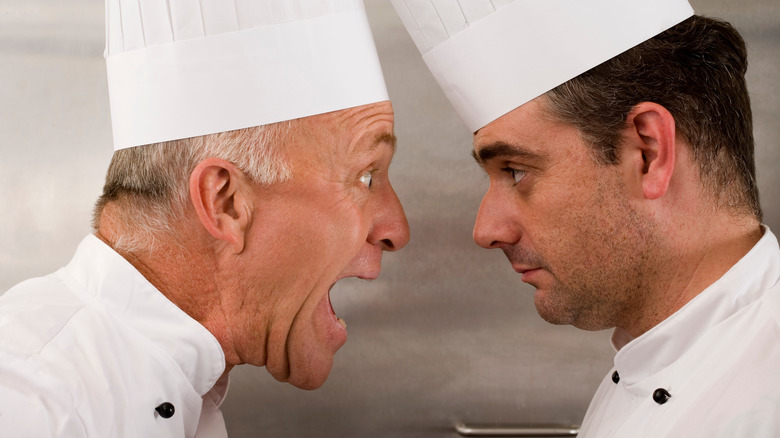Study Reveals How Shows Like Hell's Kitchen Are Making The Restaurant Industry Worse
While some of us might find comedic relief in Gordon Ramsay's explosive temper, Dr. Ellen Meiser and Dr. Penn Pantumsinchai — hosts of the podcast "The Social Breakdown" — told Grub Street that shows like his can negatively affect the restaurant industry.
"Hell's Kitchen," one of Ramsay's most famous shows, entails many long, sleepless nights, as executive producer Arthur Smith told Delish. In addition, embedded within the show are many signs of verbal and even physical abuse. However, despite the intimidating persona that Ramsay portrays on-screen, many people find working with him rather enjoyable. Nonetheless, Pantumsinchai states that showing this behavior on television is still toxic, as it contributes to "locker-room talk" in the restaurant industry. Furthermore, it normalizes and encourages that aggressive behavior among chefs, which is definitely not okay.
And the worst part is that workers will endure the abuse for the so-called great experience and the promise of where their roles now will get their careers in the future.
What this means for the restaurant industry's future
As stated prior, the media amplifies and fuels the appropriation of aggression in the kitchen. Gordon Ramsay and other celebrity chefs are considered to be "influencers." So, when they act hostile on-screen, new, real-life chefs are already prepared and expect to be the target of such behavior. Grub Street's article also states that women of all positions, are more likely to be victims of abuse in the kitchen. Men, on the other hand, reportedly did not notice signs of sexual abuse in the workplace. Dr. Ellen Meiser said, "Overwhelmingly it was people who are lower down in the hierarchy — prep cooks, line cooks — but also women, regardless of their position."
Working in an abusive workplace has everyone riding on the edges of their seats. Though Meiser and Dr. Penn Pantumsinchai credit the media for raising the entertainment value of an "abusive" kitchen, they also think this behavior breeds a system "where the abused becomes the abuser," as the former puts it. "It isn't until you break that cycle as a chef, while commanding your own kitchen that the violence actually ends," Meiser added.
"Being uncomfortable will cause people to become more aggressive," said Pantumsinchai. The toxicity in kitchens won't end until chefs themselves break this abusive cycle towards their own workers. But until then, restaurants should not use "Hell's Kitchen" as the framework for how their work environment should be structured.

